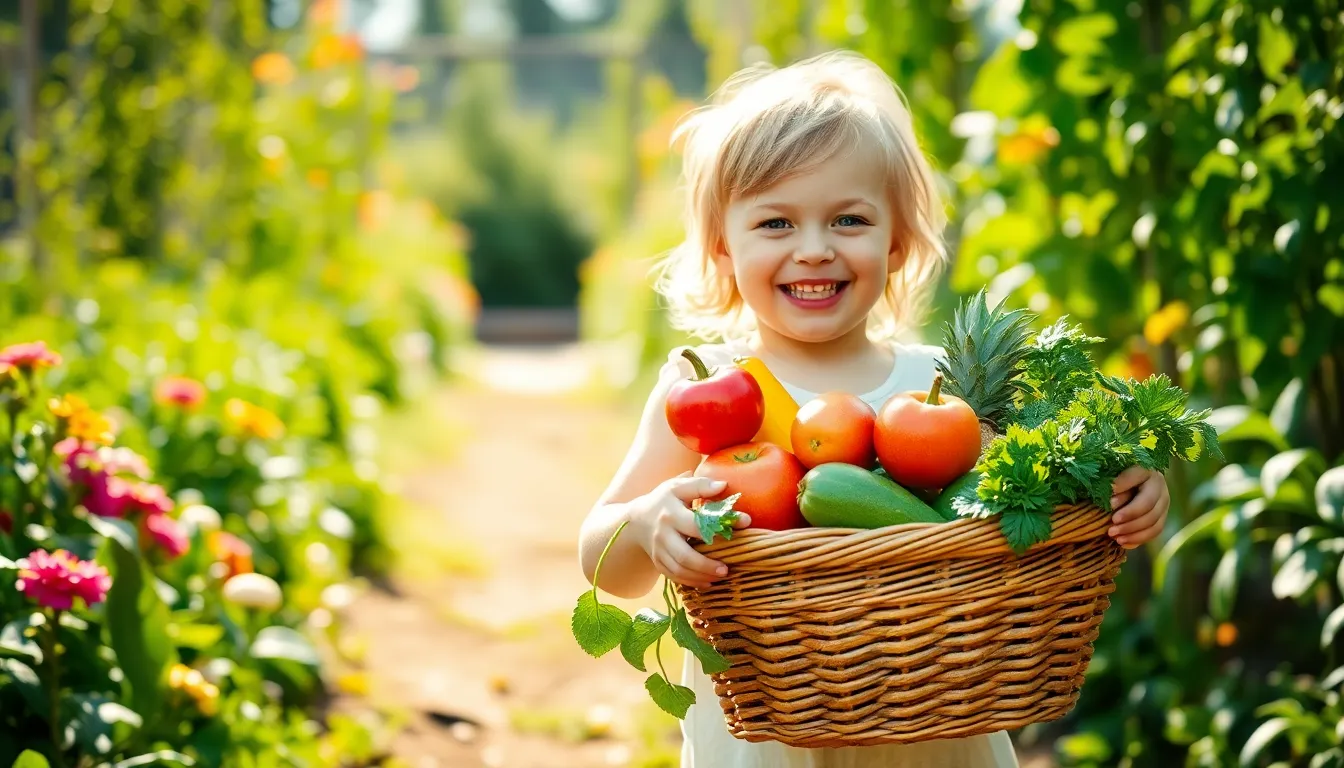Table of Contents
ToggleIn a world where kids seem to have a sixth sense for spotting candy from a mile away, introducing organic food can feel like trying to convince a cat to take a bath. But fear not! Organic food for kids isn’t just a trend; it’s a tasty adventure waiting to happen. Packed with nutrients and free from pesky pesticides, organic options can turn those little food critics into enthusiastic eaters, one carrot stick at a time.
What Is Organic Food?
Organic food refers to produce and products grown or processed without synthetic fertilizers, pesticides, or genetically modified organisms. It emphasizes natural farming practices and ensures that food maintains its health benefits and flavor.
Definition of Organic Food
Organic food includes fruits, vegetables, grains, dairy products, and meats produced according to stringent regulations. The USDA defines organic farming methods, which prioritize soil health, ecological balance, and biodiversity. Certification involves rigorous standards that farmers must follow, ensuring transparency and authenticity in organic labeling. Growing organic food eliminates harmful chemicals, promoting healthier options for children.
Benefits of Organic Food
Organic food offers numerous advantages for kids. It typically contains higher levels of essential nutrients such as antioxidants and vitamins. Research indicates organic produce may have lower pesticide residues, leading to a reduced risk of health issues. Choosing organic options can enhance taste and support sustainable farming practices, contributing to environmental well-being. Additionally, consuming organic food may foster better dietary habits in children, encouraging a preference for fresh, unprocessed foods.
Importance of Organic Food for Kids

Organic food provides essential nutrition for children, promoting growth and development. Choosing organic options supports healthier eating habits and environmental sustainability.
Nutritional Benefits
Organic food often contains greater amounts of vitamins, minerals, and antioxidants than conventional counterparts. A study by the British Journal of Nutrition found that organic produce may offer 20 to 40 percent more antioxidants. Organic options also limit exposure to harmful pesticides and synthetic additives, reducing potential health risks. Parents choosing organic food for their kids often notice improved energy levels and overall health. Nutritional integrity remains a key factor in fostering a balanced diet, influencing children’s long-term health outcomes.
Environmental Impact
Opting for organic food positively impacts the environment by promoting sustainable farming practices. Organic farming methods enhance soil quality, reduce soil erosion, and protect waterways from harmful chemicals. According to the USDA, organic farming fosters biodiversity, benefiting local ecosystems. Children exposed to organic food often develop a deeper appreciation for nature and the food supply chain. Supporting organic agriculture contributes to reduced carbon footprints and healthier communities.
Types of Organic Foods Suitable for Kids
Organic foods come in various forms that cater to children’s tastes and nutritional needs. The selection includes fruits, vegetables, dairy, and meat products, all offering health benefits for young ones.
Organic Fruits and Vegetables
Organic fruits and vegetables provide essential vitamins and minerals. Children benefit from options like apples, bananas, carrots, and spinach. These foods often contain fewer pesticides, making them a safer choice. Seasonal fruits, such as berries and oranges, offer antioxidants, which can further support health. Fresh organic vegetables add fiber to kids’ diets, aiding digestion. Regular consumption may even encourage kids to explore more varieties.
Organic Dairy and Meat Products
Organic dairy and meat products present nutritious alternatives for children’s diets. Milk, yogurt, and cheese made from organic sources are rich in calcium and protein while minimizing exposure to harmful chemicals. Organic eggs come from hens that receive organic feed, ensuring healthier options. Lean cuts of organic meat, such as chicken and turkey, provide essential nutrients like iron and zinc. Choosing organic ensures that kids consume products free from antibiotics and hormones. Prioritizing these foods can promote overall well-being for growing children.
Tips for Incorporating Organic Food into Kids’ Diet
Incorporating organic food into kids’ diets can be enjoyable and fulfilling. Families can adopt strategies and recipes that make this transition smooth.
Meal Planning Strategies
Start by creating a weekly meal plan focusing on organic ingredients. Include a variety of organic fruits, vegetables, and whole grains for balanced nutrition. Stick to seasonal produce because it offers peak flavor and freshness. Shopping at local farmers’ markets often provides access to organic options. Engage kids in meal prep, allowing them to help wash and chop veggies. This involvement fosters excitement about eating healthy dishes. Prepare meals in bulk; freezing portions ensures easy access to nutritious organic meals during busy days.
Creative Recipes
Experiment with simple organic recipes to keep mealtimes interesting. Create colorful smoothies using organic fruits and leafy greens. Chopped organic apples with peanut butter make a nutritious snack. Try making whole grain pancakes with organic blueberries for breakfast. Encourage kids to customize their own organic pizza using whole grain crust and fresh vegetables. Homemade organic vegetable soup can be a fun project, allowing kids to choose their favorite veggies. Offer dips made from organic yogurt to accompany cut vegetables, enhancing their appeal. These engaging recipes promote a love for organic food in kids.
Common Misconceptions About Organic Food for Kids
Many parents hold misgivings about the cost and value of organic food for children. These misconceptions often arise from comparing the price of organic produce to conventional options without considering quality. Organic food typically offers better nutritional profiles, including more vitamins and antioxidants. Spending a bit more on organic can lead to healthier eating habits, which may reduce health-related expenses down the road.
Price vs. Quality
Parents might believe that organic food is too expensive to justify for their children. Many studies indicate that organic options provide higher nutrient levels, justifying the cost. Healthier children often require fewer medical visits, adding potential savings. Investing in organic food cultivates better dietary habits, giving kids a preference for fresh produce. It’s important to recognize that the long-term benefits of organic consumption can outweigh initial expenses, especially when considering overall health outcomes.
Organic Labels and Certifications
Understanding organic labels can create confusion. The USDA sets strict guidelines for labeling, ensuring transparency and authenticity. Products labeled “100% Organic” contain only organic ingredients, while “Organic” has at least 95% organic content. “Made with Organic Ingredients” contains at least 70% organic components, but might include non-organic additions. Being informed about these classifications allows parents to make educated choices that align with their health goals for children. Familiarity with labels ensures that families can trust the products they purchase, supporting health and environmental sustainability.
Embracing organic food for kids opens a world of nutritious possibilities. It not only enhances children’s health but also nurtures a lifelong appreciation for wholesome eating. By prioritizing organic options, parents can instill better dietary habits and support sustainable farming practices that benefit the environment.
The journey to introducing organic foods may require creativity and patience, but the rewards are significant. From improved energy levels to a reduced risk of pesticide exposure, organic choices lay a strong foundation for children’s growth and well-being. Ultimately, making informed decisions about food can pave the way for healthier futures for both kids and the planet.




